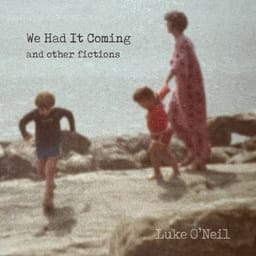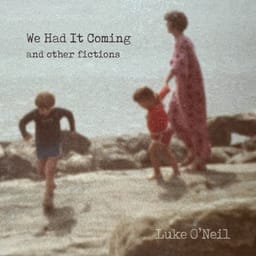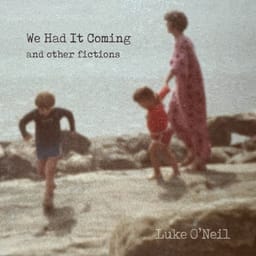Every headline is a moral injury

Every single post is like a punch in the face. Every headline is a moral injury.
Could be I’m extending too much grace here but it occurred to me recently that maybe all of the people who “don’t pay attention to politics” one day tuned out not because of their indifference to others’ suffering but for the exact opposite reason. It’s all too much to behold.
And then eventually you’re under foot and pinned down yourself and you no longer have the pleasure of apathy.
There are moments in every horror movie where the characters’ casual behavior despite evidence of obvious malevolence in the shadows strikes us as ridiculous but isn’t it always so much easier to tell yourself it was probably just the wind? The creaking floorboards of an old home. Pulling the sheets up over your head like a child does.
Every single thing is political. I know that. I know there’s no escaping it.
I’ve found myself doing something for the first time in my life lately which is racially profiling people. Out of concern rather than malice that is. Sizing up some guy. I hope this poor son of a bitch makes it home safe tonight. In the morning behind the laborers in line at Dunkin Donuts. Every single 4’10 cashier girl at my Market Basket. Please let this person’s life remain at the baseline level of “not that great” we have all become accustomed to.
I dream of something better for all of us of course. But I do not expect it presently.
Every time I go to turn on the baseball game this week they're doing the National Anthem. The whole production. How many times do they need to sing this fucking song?
It's always been a sick joke to have to watch people go through these motions but rarely as much as it is now.
They teargassed a children's Halloween parade and they broke the ribs of an old man coming home from a jog and they punched and dragged a man's face across the concrete.
It's so strange that actual villains walk among us. I don't mean the Los Angeles Dodgers.
I already knew that and you already knew that but its horrific novelty never ceases.
There are bonafide monsters stalking the earth eagerly and enthusiastically distributing suffering to anyone they please. And with no recourse on our end but to film them and shout and beg for anyone with power to stop them. How convenient that the monopoly on violence always also acts as a shield.
We rarely get too many trick or treaters and last night was no different. M. was traveling yesterday and caught in flight delay limbo and I thought just now to tell her about the kids that did come. I realized I didn't even register what costumes they were wearing. Maybe I was afraid to look any of them in the eye.
If you're looking for a food pantry to donate to, or if you're in Massachusetts and looking for a place to find food, this one I've done some volunteering at is recommended.

Hope you're in the market for some more One Battle After Another discourse because today Christopher Harris pushes back against the almost universal praise the film has been getting.
"I think well-meaning folks desperately want OBAA to say something, so they decide it does. But I also think Matty Goddamn Yglasias and the titans of Hollywood are willing to go rapturous over a film like this because in the end, PTA’s 'vision of revolution' is so so so safe. This is a formally inventive, intellectually timid movie," he writes.
Read it down below or here.
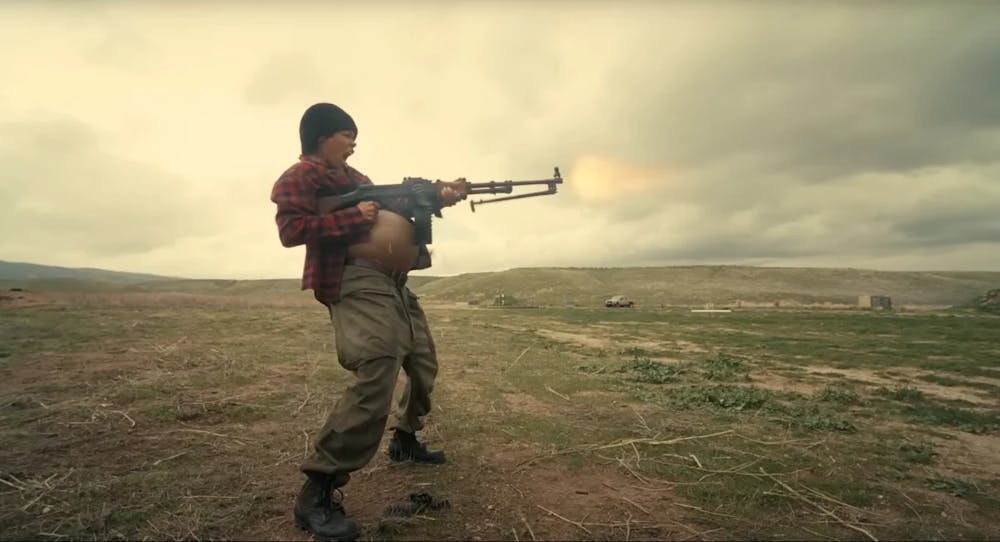
Sean T. Collins wrote about OBAA in comparison to the Kneecap film a couple weeks back.

Harris recently wrote about the new album Getting Killed by the ascendant New York band Geese.

Did I mention my little book tour yet? No? Ok fine then here are the details.
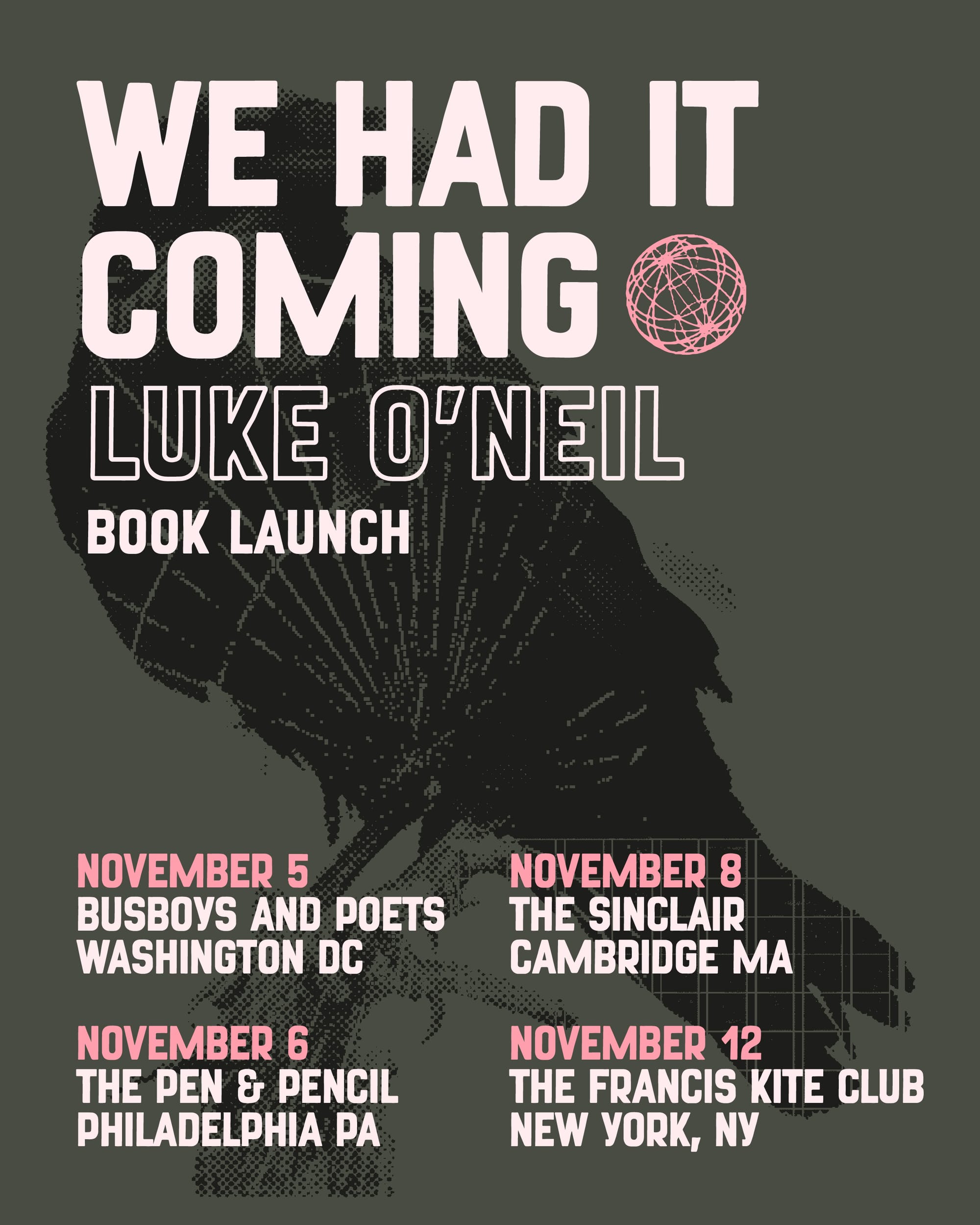
DC: Wednesday, November 5, 6 p.m. at Busboys & Poets (Brookland)
Philly: Thursday, November 6, 7 p.m. at the Pen & Pencil
Cambridge: Saturday, November 8, 4 p.m. at The Sinclair
New York: Wednesday, November 12, 6 p.m. at the Francis Kite Club
Please RSVP to the DC and NYC dates.
Joining me in DC this coming week will be Patrick Reis, Ted Scheinman, Chris Scott, and Derek Davison.
Please check out the latest episode of Davison's American Prestige pod featuring a discussion with sociologist Charles Derber and his book Bonfire: American Sociocide, Broken Relations, and the Quest for Democracy.
I really liked this piece by Scheinman about reading Petronius from a couple years back.
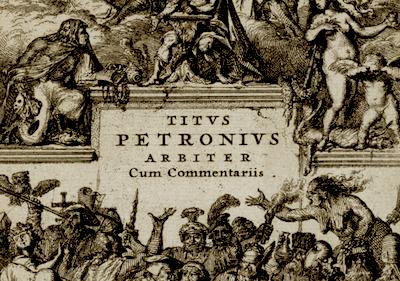
April, Eliot writes, is the month that “stir[s] / Dull roots with spring rain.” It was also the month, this year, when I decided to begin electroconvulsive therapy to treat a months-long depression that was verging on the paralytic. The decision has largely paid off, and I am no longer immobilized the way I was this spring. But in my desire to escape the stony rubbish of depression, I chose a treatment famous for corroding memory. Accordingly, my recollections of the past year and a half are now a patchwork of broken images, blurry moments of fear and tenderness, of kindnesses from the friends who kept me sane and whom I fear I can never fully repay. When you have forgotten so many things — so many moments of love and adventure, rivers and trees and books and albums, all the joys and desires and commitments that collaborated to make you who you are, or were — you are left to reconstruct yourself based on nothing but the irreparably damaged present. The task, then, is to recognize that you are more than the fragments you have gathered to shore against your ruin. The effort to reactivate as much of my memory as possible led me back to the Latin texts that had been so central to my work in college and graduate school, and particularly to the precious fragments of Petronius’s remarkable novel that remain. Soon, I remembered why I had loved the Satyricon so much, and who I had been when I first loved it. If the broken pieces of this novel, much of which is now lost to time, can still evoke the pleasures and humors and insights of the irretrievable whole, I thought, then perhaps my own fragmentary memories could be enough. Indeed, perhaps it would be greedy to ask for more.
This was some great reporting by Reiss and company at Rolling Stone about Trump's efforts to kill as many death row inmates as possible.
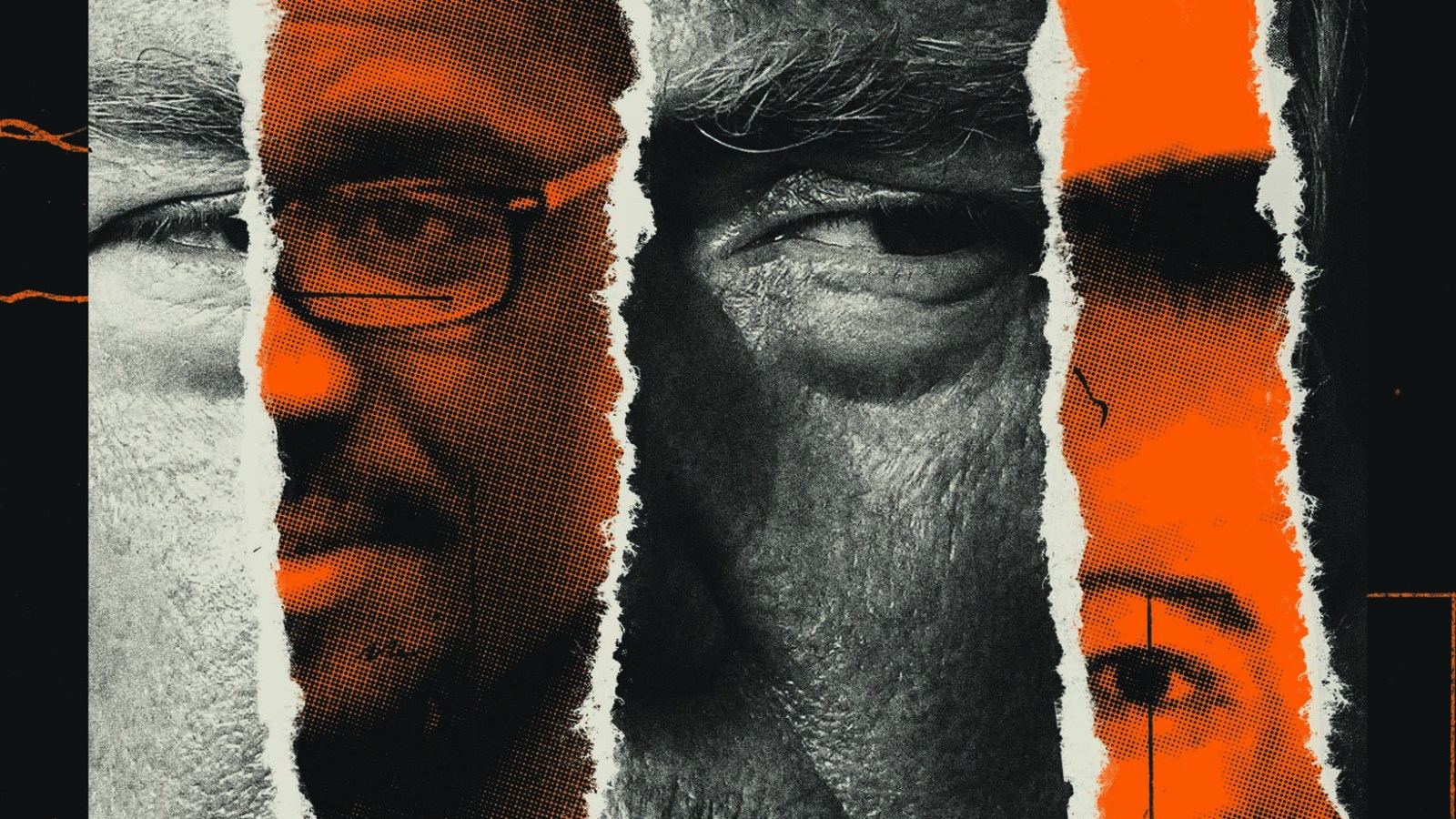
Donald Trump’s enthusiasm for the death penalty dates back decades. His first real foray into politics was a public call for executions after five teenagers of color were arrested in the brutal rape and assault of a female jogger in New York City in 1989. “Bring back the death penalty. Bring back our police,” screamed a full-page ad Trump had placed in the New York Daily News at the time. The Central Park Five, as the young men came to be known, were later exonerated by DNA evidence, after they had served years in prison. But Trump never apologized for the ad.
By the time he was preparing for his first presidential run, Trump was pitching capital punishment to the American people again. In a May 2015 appearance on Fox & Friends, responding to the killing of two police officers in Mississippi, Trump said the death penalty should be “brought back strong.” Once in office, he suggested it as a potential remedy to the nation’s opioid crisis, a tool that could be used against dealers as a deterrent. (“If you shoot one person, they give you the death penalty,” he said. “These people can kill 2,000, 3,000 people, and nothing happens to them.”)
And this is a typically delightful and funny short story by Scott.

“You want a big house?” D.A.R.E. cop asks the classroom. “You want a cool car? What’s your favorite car.”
Derek takes this one. Of course he does. Fucking Derek. “‘76 Corvette Stingray. Sky blue.”
“Hell yeah, brother,” D.A.R.E cop walks right up to Derek’s desk, leans over, gets right in his face. “But guess what. You’re never getting that Corvette. Ain’t happening. Because you tried meth one time.”
Derek puts his hands up like he’s under arrest. “No I didn’t.”
Speaking of Chris Scott he has some great taste I have to say.
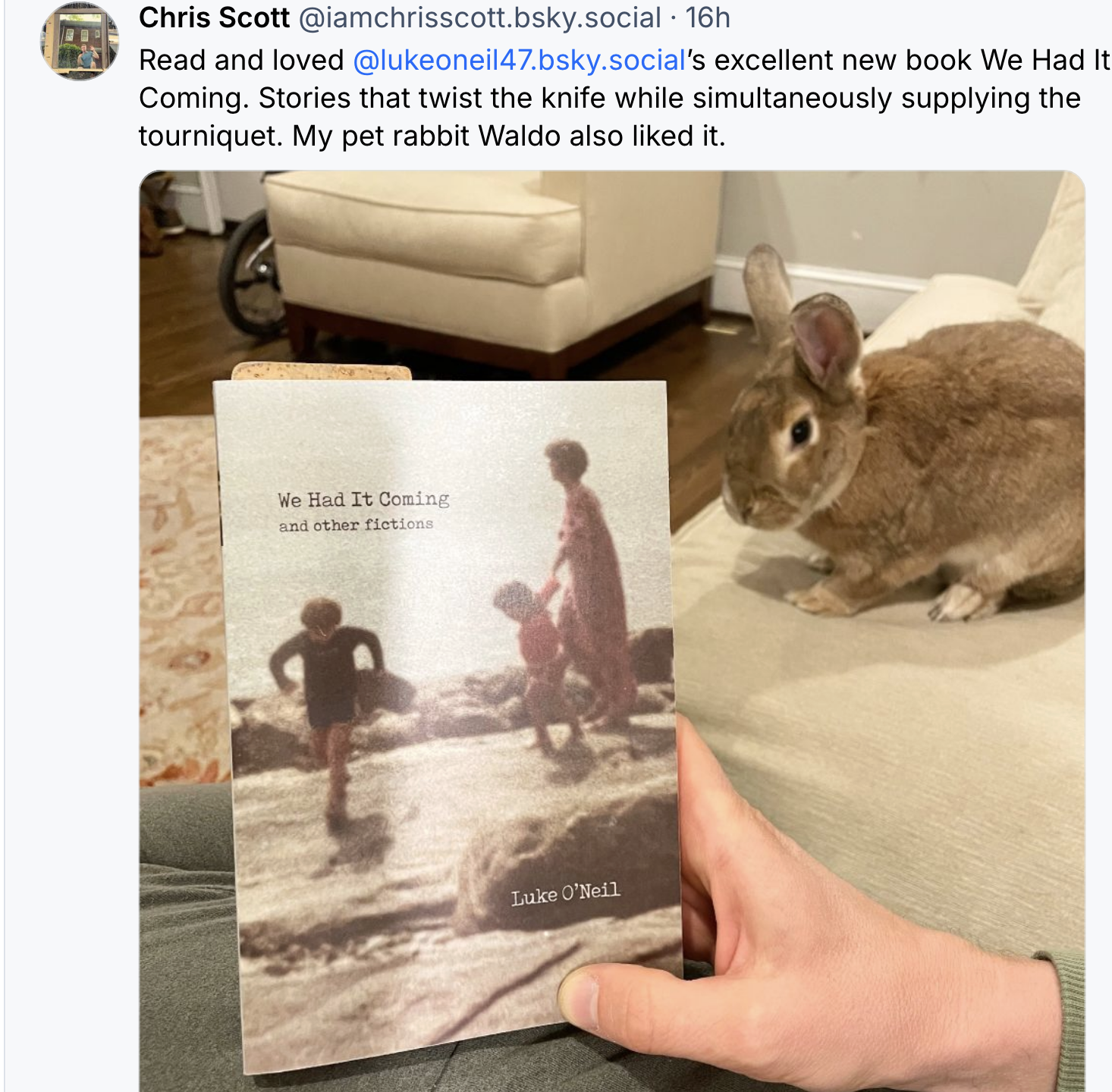
I wonder if Waldo liked the one about the bunnies?
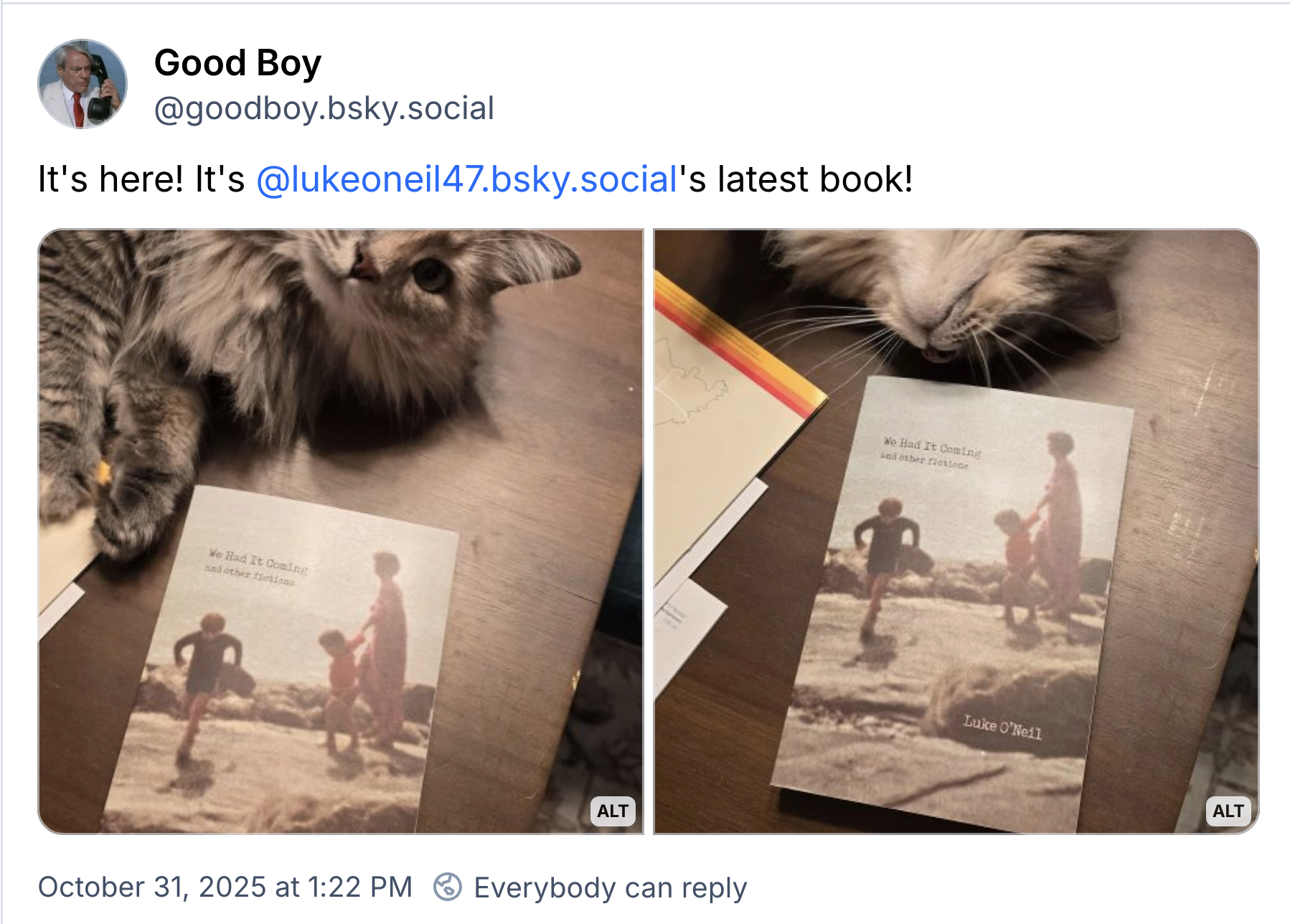

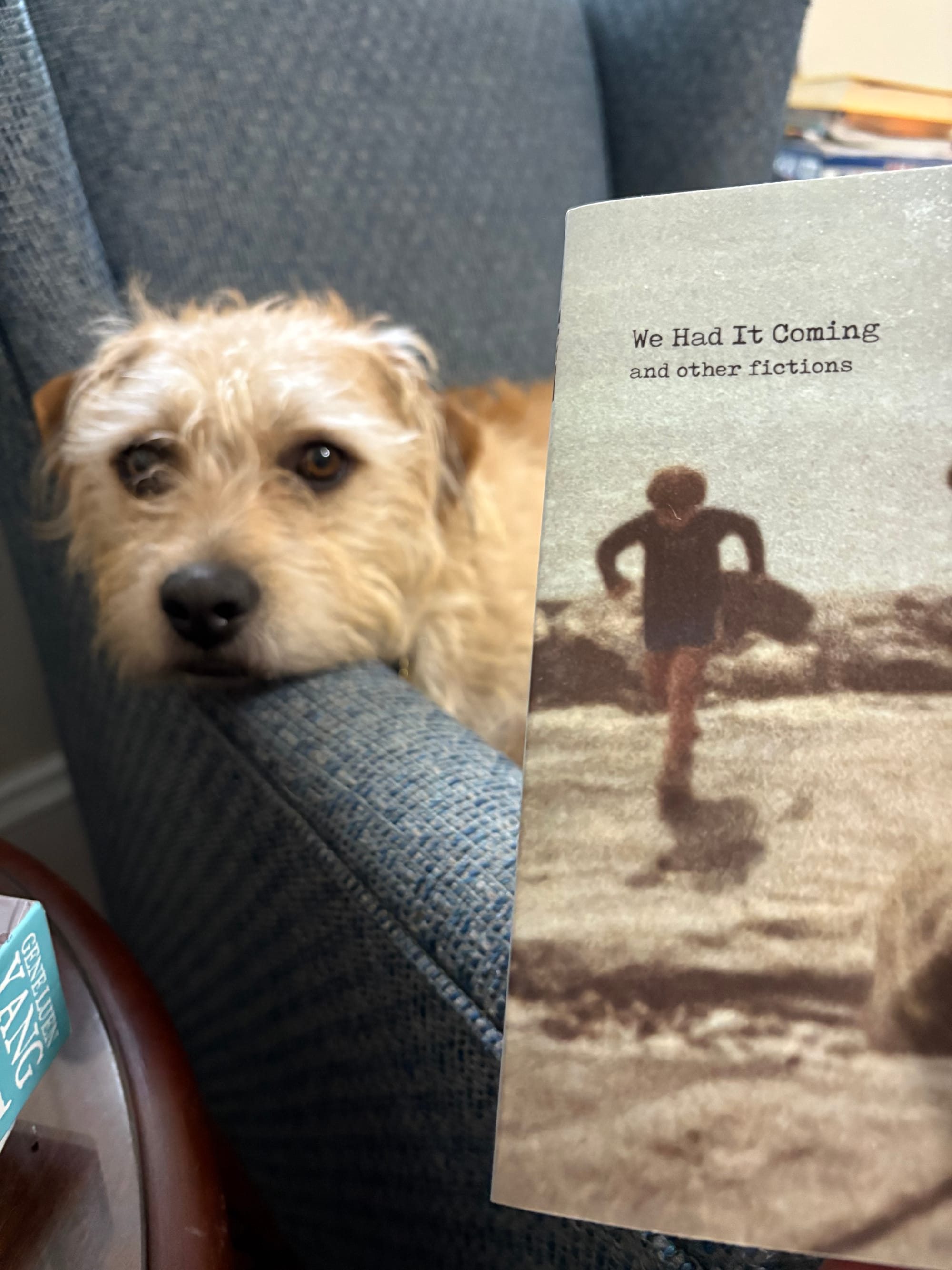
I like it when people send me photos of the book with their pet or other assorted mascots.
Thanks also to Andy of Bookshop.org for this succinct review. Maybe go patronize that fine website for all your book needs eh?
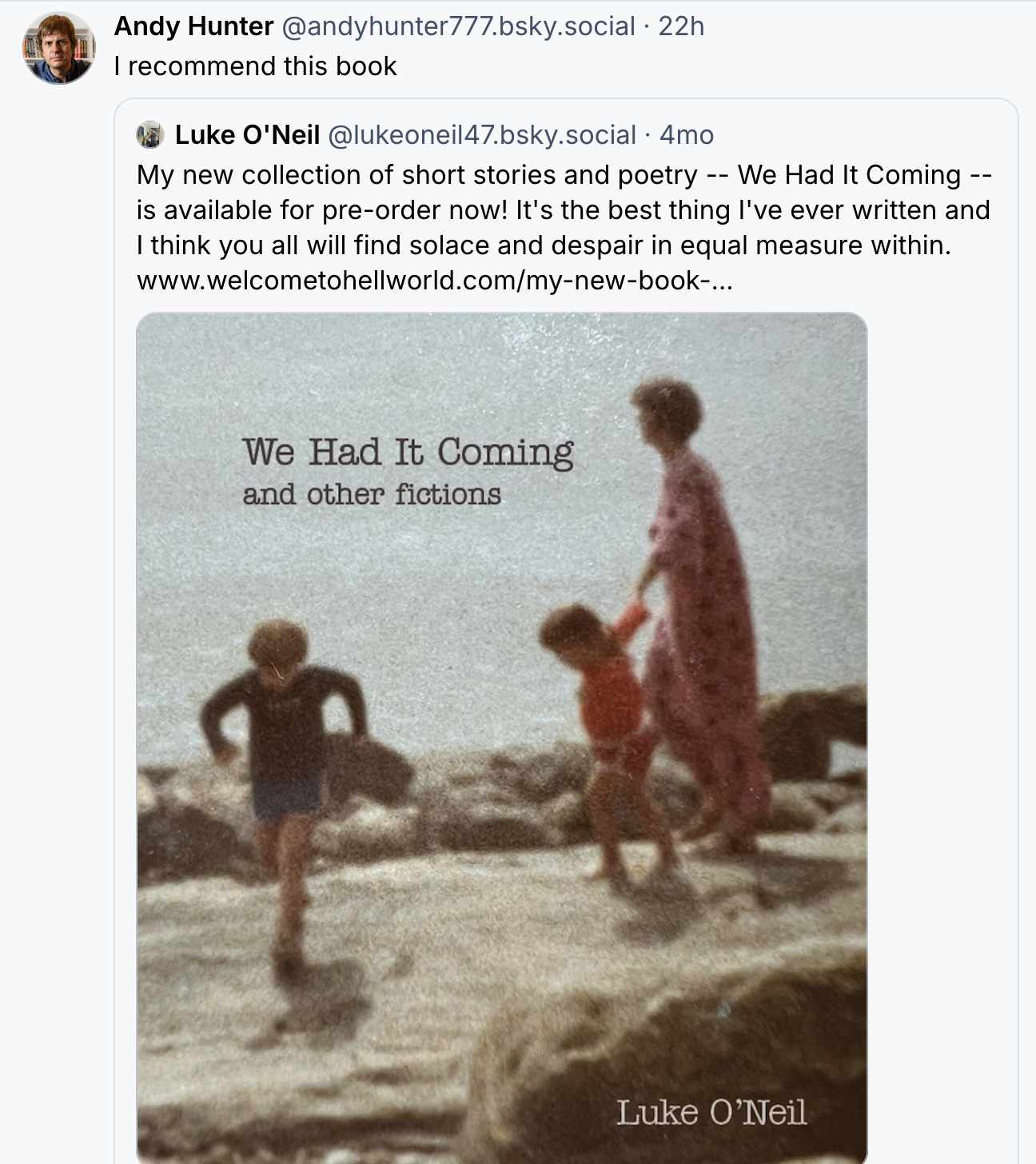
Or if you're in Cambridge go by Porter Square Books.
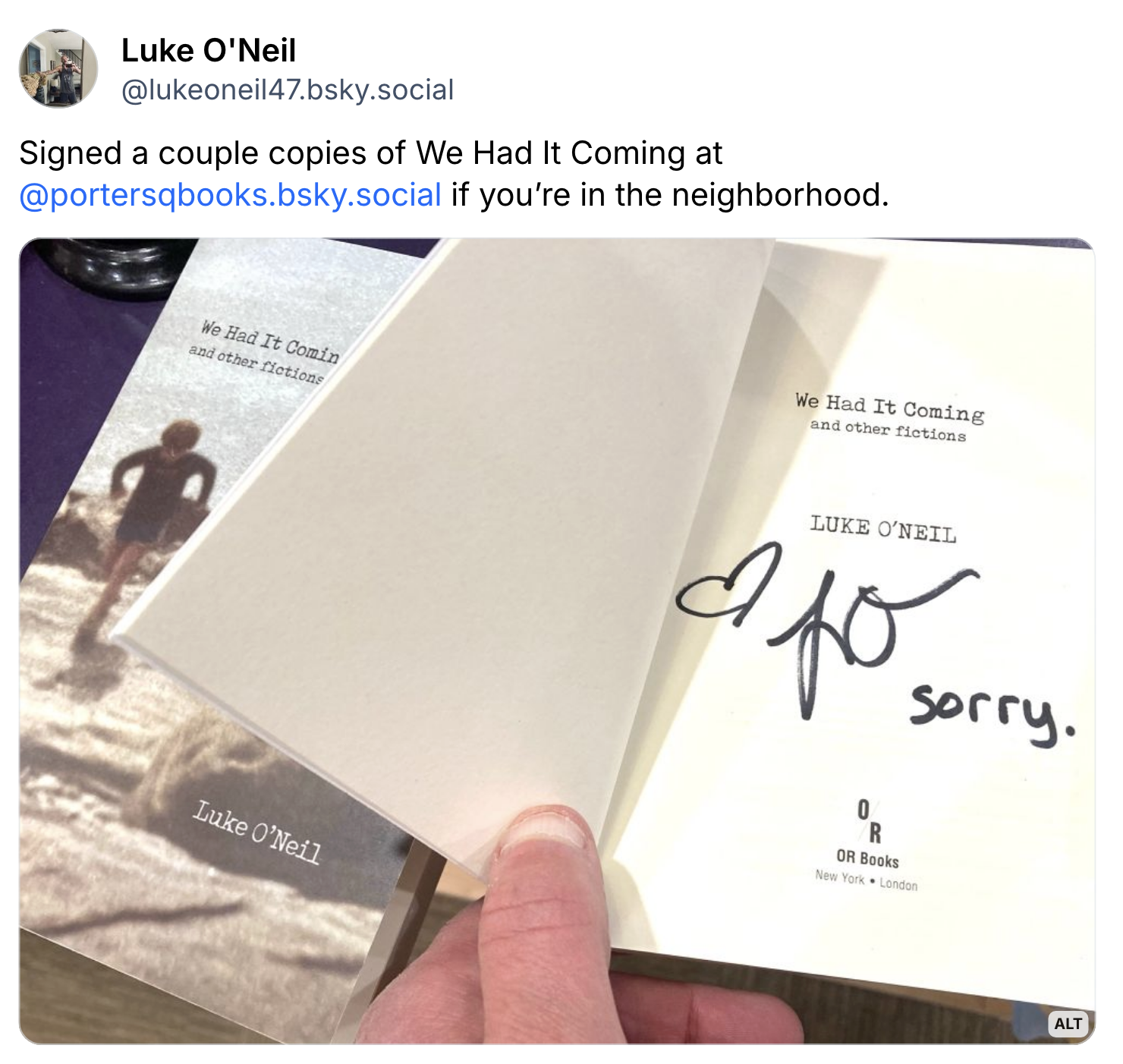
Thanks also to Bill Shea for the nice review amidst a bunch of good writing about Jack Kerouac and Chet Baker at his fine newsletter.
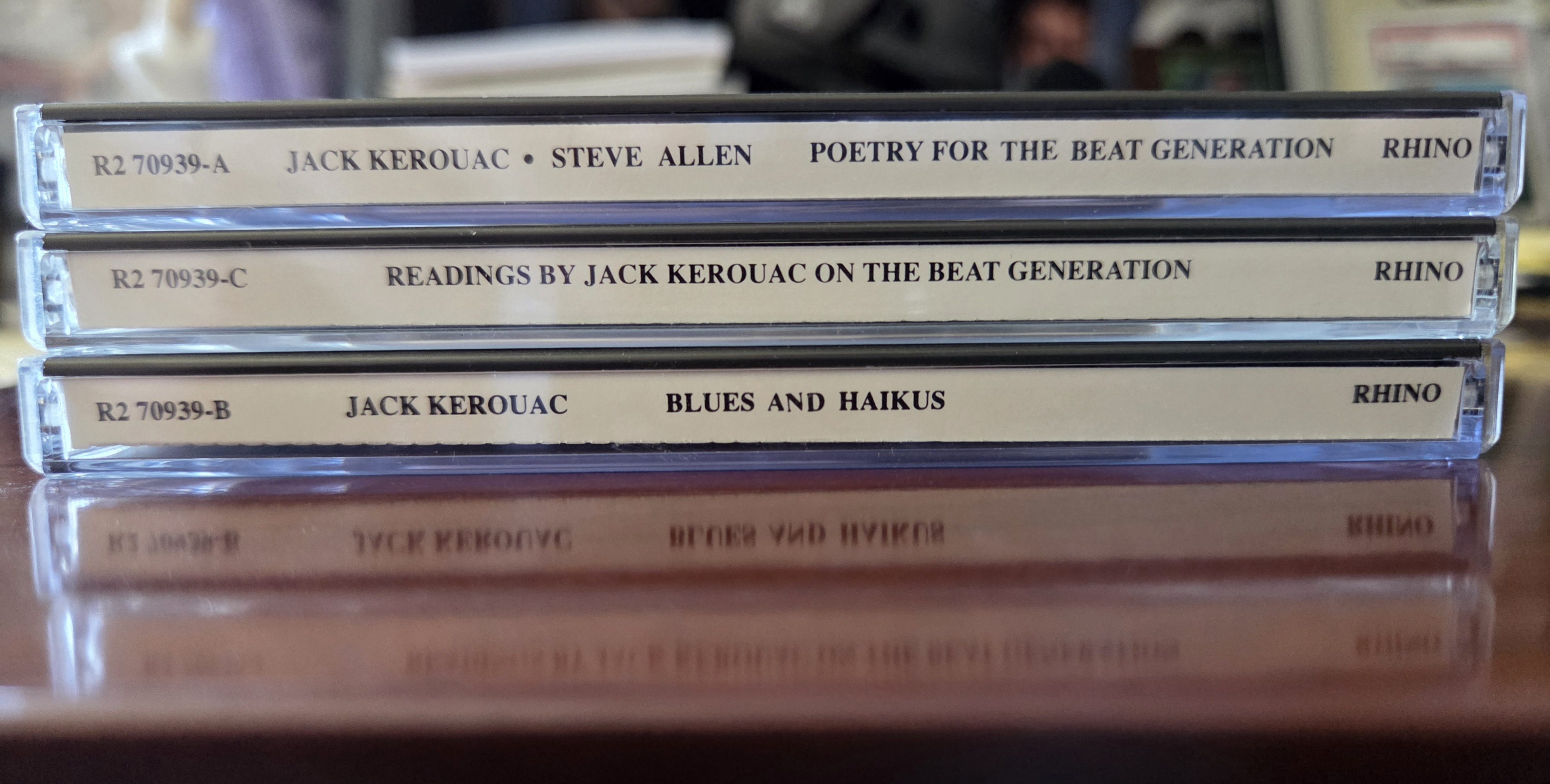
We Had It Coming: I’ve been a fan of Luke O’Neil’s “Hell Word” writing for many years, and he’s the righteously angry and witty author of this new volume of fiction and poetry that’s written in his usual unique stream-of-consciousness style. If you live in end-stage capitalism 2025 and everything you see and experience makes you want to scream and pull your hair out, O’Neil is for you. He doesn’t leave you hopeless, but you recognize the rage and despair at the vulgar, cruel stupidity of it all from the micro to the macro level. He also makes you laugh, and I’m not sure anything is more important today that being able to laugh despite … well, everything. If this book isn’t required reading in college classes a century from now, then we’ve truly fucked up.
Read another new excerpt from the book at Flaming Hydra.

They told us that we were not killing him when it came time to turn off the machines but then what were we doing?
I do not know and I will never know and neither will you.
They said there was nothing left to be done anymore. All potential avenues had been explored. Somberly and politely and professionally they told us that. Touching our shoulders perhaps.
Shaking the doctor's hand like a salesman we were closing a deal with.
And this assemblage of children some of whom barely knew each other or barely even knew him were suddenly thrown together like a ragtag group in a heist movie except what we were stealing was a life.
Ok fuck it here's Harris on One Battle After Another. Paid readers can stick around after that for the best things I read this week, the best Halloween costume I saw, plus some... I don't know funny posts (?) and new music to enjoy.
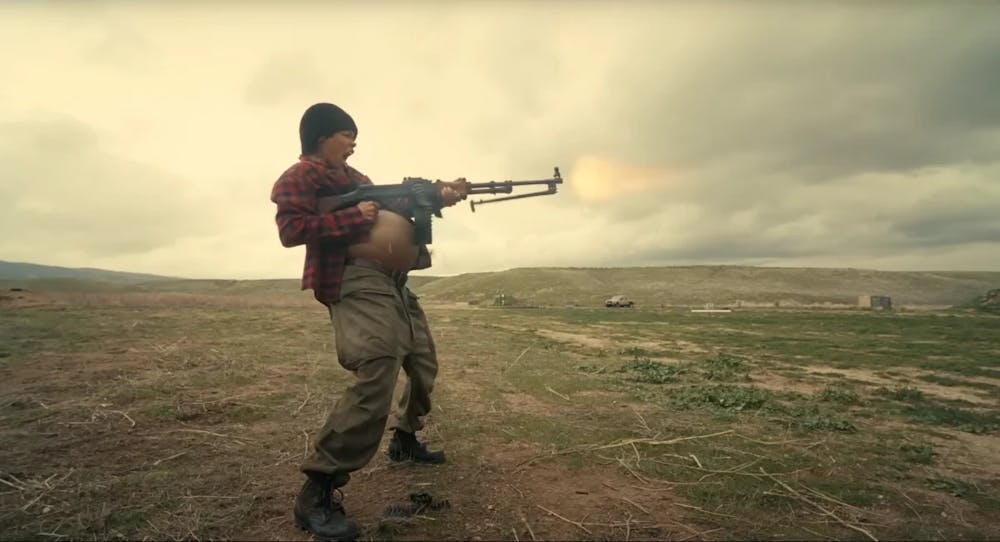
The very idea of revolution
by Christopher Harris
Like you I scroll in horror daily at the ease with which fascists have overrun the gates. I go to protests, I donate to socialist campaigns, my charity of choice is Feeding America, I volunteer at a food bank, and oh, fuck, now that I’m at the end of the list it doesn’t feel like a lot. But it’s important to my self-image that I believe my heart is in the right place. For God’s sake, I even subscribe to Hell World.
So when my favorite director makes an epic film loosely based on a novel by one of my favorite writers, and that film is immediately hailed as “essential to our troubled modern times” and “a dark comic mirror to the way we live” and “a big vision to the danger and anxiety of our moment,” and when the New York Times (I know, I know) publishes an op-ed calling the film “an antifascist movie at a fascist moment,” well then this should be the one for me right? Paul Thomas Anderson’s career-capping statement about Trump’s America? A blistering takedown of conservative pathologies? A revelation about individual power in the face of the billionaire extraction machine? That sure sounds like The Movie We Need Right Now.
Instead, I think One Battle After Another is…fine.
You might like it more. That’s not really what I want to talk about. What interests me most about OBAA is actually the acclaim, which I find weird and possibly in some cases insidious. But to get there, we probably need a few words about the movie. There’s nothing worse than a killjoy explaining that a thing you appreciated wasn’t worth it, so I won’t do that. It’s got one action sequence shot with Nolan-esque ticktock precision, and another drawing fair comparisons to The French Connection. Benicio del Toro is as good as everyone says, tamping down his most rococo urges. Subtextualists looking for revolutionary references are well-fed: Leo DiCaprio’s character watches The Battle Of Algiers and PTA needle-drops Gil Scott-Heron. It’s the first film shot entirely with VistaVision since 1961, and in particular the lighting is truly wonderful.
Of course, when the fourth-most-positive thing you say about a movie involves its lighting, other stuff may not work for you. To me, Sean Penn seems shipped in from a Dr. Strangelove cosplay convention. The Christmas Adventurers Club plays like an SNL skit. The screenplay takes detours vaguely inspired by Thomas Pynchon’s source material that don’t work and aren’t necessary (e.g., the convent where Willa briefly winds up descends from Pynchon’s hilarious ninja nuns, who occupy a good portion of Vineland but just don’t matter much here). The third act couldn’t happen without people doing narratively convenient, out-of-character things (e.g., the Native American bounty hunter growing a conscience at exactly the right moment). And the less said about Colonel Lockjaw going full Looney Tunes surviving a bullet to the face so he can be euthanized, the better. There are laughs and thrills and radiance enough to make OBAA worth enjoying. I’m just not actually sure why it exists.
I know many people don’t find the film as philosophically muddy as I do, and I know willfully misinterpreting art to fit one’s purpose is older than Socrates. But buddy, when your movie has dozens of gleeful reviews calling it a glorious anti-Trump statement, dozens of rightwing morons calling it “apologia for radical left-wing terrorism,” and dozens of other free-thinkers detachedly scratching their chins declaring, “I get it, you’re satirizing the very idea of revolution,” the script may have needed a few more passes. The movie’s defenders have raced to provide subtext that fills in OBAA’s blanks, where the text is largely silent: “No-no-no-no, see, PTA himself has mixed-race children, which means this film is about the failure of Gen X and how the reins need to be given over to Gen Z, oh, and also Perfidia is actually the hero because she won’t compromise, plus, um, it shows an Underground Railroad for undocumented people so, uh…yay?” I certainly believe my friends who say they loved OBAA. I also believe its action and comedy and set pieces worked for them better than they worked for me.
I just kind of don’t believe Matt Yglesias. And I don’t believe The Economist. And I don’t believe The Wall Street Journal, or Variety, or any of the other institutions who might not love the sight of ICE herding brown people from their homes and workplaces, but for whom such a thing isn’t a dealbreaker. Centrism’s project is strengthening existing structures, so what to do with a movie that purports to be about revolt? On the one hand, you can just praise it. Call it “a masterclass in making a political film.” Invoke Gavin Fucking Newsom as a voice for political clarity, while the rest of us are “caught in a zone halfway between resistance and despair.”
Or, on the other hand, you can decide it’s a satire of the left. Here’s Yglesias: “The French 75 are battling an authoritarian regime but they’re not accomplishing anything useful, they’re not particularly heroic as individuals, and it seems plausible that their brand of resistance backfired and brought about the outcome they were trying to fight.”
Purveyors of change depicted as destructive poseurs? I wonder why Matty likes it.
I went into OBAA unaware of the discourse; I found it missing a coherent core, then discovered over-the-top praise for a philosophy I still, upon a second watch, can’t really find. Who wouldn’t want a movie that does all the things OBAA’s boosters say it does? “A radical blast of action!” “A very serious, relevant response to the U.S.’s secretive ruling class!” “A sprawling attempt to wrap its arms around the Great-Step-Backward Age we find ourselves in!” Within the actual movie, I can squint and see hazy outlines of these things, but with precious little follow-through. Variety (around since 1905, owned by the offspring of an automotive oligarch) proclaims that DiCaprio’s character’s inability to remember a code-word reflects “the filmmaker’s perception of everything that has gone wrong in liberal bureaucratic culture.” It does? Huh. The Hollywood Reporter (around since 1930, owned by the same third-base-born scion) rapturously celebrates the movie’s “disarmingly noble purpose” and its fight “for all marginalized people being so stridently attacked and demeaned across the nation every day.”
I suppose the film does acknowledge those people exist. We see them several times being shuttled wordlessly to safety. But I don’t know what OBAA has to say about them other than “Crime, boy, I don’t know.”
In a piece for Defector that made me feel less crazy, Jason England says that for a certain kind of 2025 viewer, “any vaguely liberal message (is seen) as profound and worth celebrating…. This sort of art…is an extension of our incoherence and desperation sold back to us as its cure. We validate it to reassure ourselves.” I think that’s true. I think well-meaning folks desperately want OBAA to say something, so they decide it does. But I also think Matty Goddamn Yglasias and the titans of Hollywood are willing to go rapturous over a film like this because in the end, PTA’s “vision of revolution” is so so so safe. This is a formally inventive, intellectually timid movie. Plot armor abounds. The heroic teen isn’t gonna get hurt. The goofy robe-wearing dad is gonna learn family is wherever you make it. The bad guy’s gonna get killed twice. The first time I watched, unburdened by anything but excitement for new PTA, I felt this gradually. The second time, it was stultifying. These are goofy, wisecracking, doe-eyed heroes, and the movie has no interest in punishing them or teaching them anything beyond “bad people are bad.” For all the guns and sacrificial side characters and bravura shots and (yes) delirious lighting, OBAA has no interest in upsetting you or, really, the apple cart. I’m glad England introduced the term “liberal” so I don’t have to: there really is something so self-congratulatingly liberal about the pillar institutions of Hollywood (and the Oscars) rushing to embrace this film. “Yes. Yes! This is exactly how far rebellion should go. Perfect. No notes. Uh, now, please leave our mansions alone.”
In his review for Hell World on the movie’s release, Sean T. Collins paired One Battle After Another with Kneecap, which I discovered thanks to him and found to be a significantly more dangerous and credible portrayal of what resistance looks like in the actual world. For a more direct comparison, I’ll add the 2022 film How To Blow Up A Pipeline. (A lot fewer laughs in that one though.) Instead it does what the title says: eco-terrorists decide nothing will ever dissuade industrial- and state-backed polluters without violent action, so they act. It’s exciting as hell, its point of view isn’t shrouded in quirk, and it’s dangerous. I’ve seen it four times and the arm of my couch has permanent fingerprint dents. Yes, different movies have different modes and mannerisms, and I’m perilously close to being the guy who’s only seen Boss Baby saying he’s getting a lot of Boss Baby vibes, but I think PTA wants us to be as nervous for his victims of billionaire persecution as Pipeline makes us for its own. I just think he badly fails. And maybe you think Pipeline’s moral clarity in a time of darkness is childish, and it’s actually OBAA that presents a realistic contemporary view of revolution. But when the folks who don’t actually want anything to change rush in to praise how meaningful your film about change is? It should make you wonder.
Chris Harris has an MFA from UMass and is the author of four novels. He also spent eight years at ESPN, and currently covers the NFL at HarrisFootball.com. Find him on Bluesky: @harrisfootball.com
Alright now if this person had showed up at my door trick or treating I would have a lot to say!


